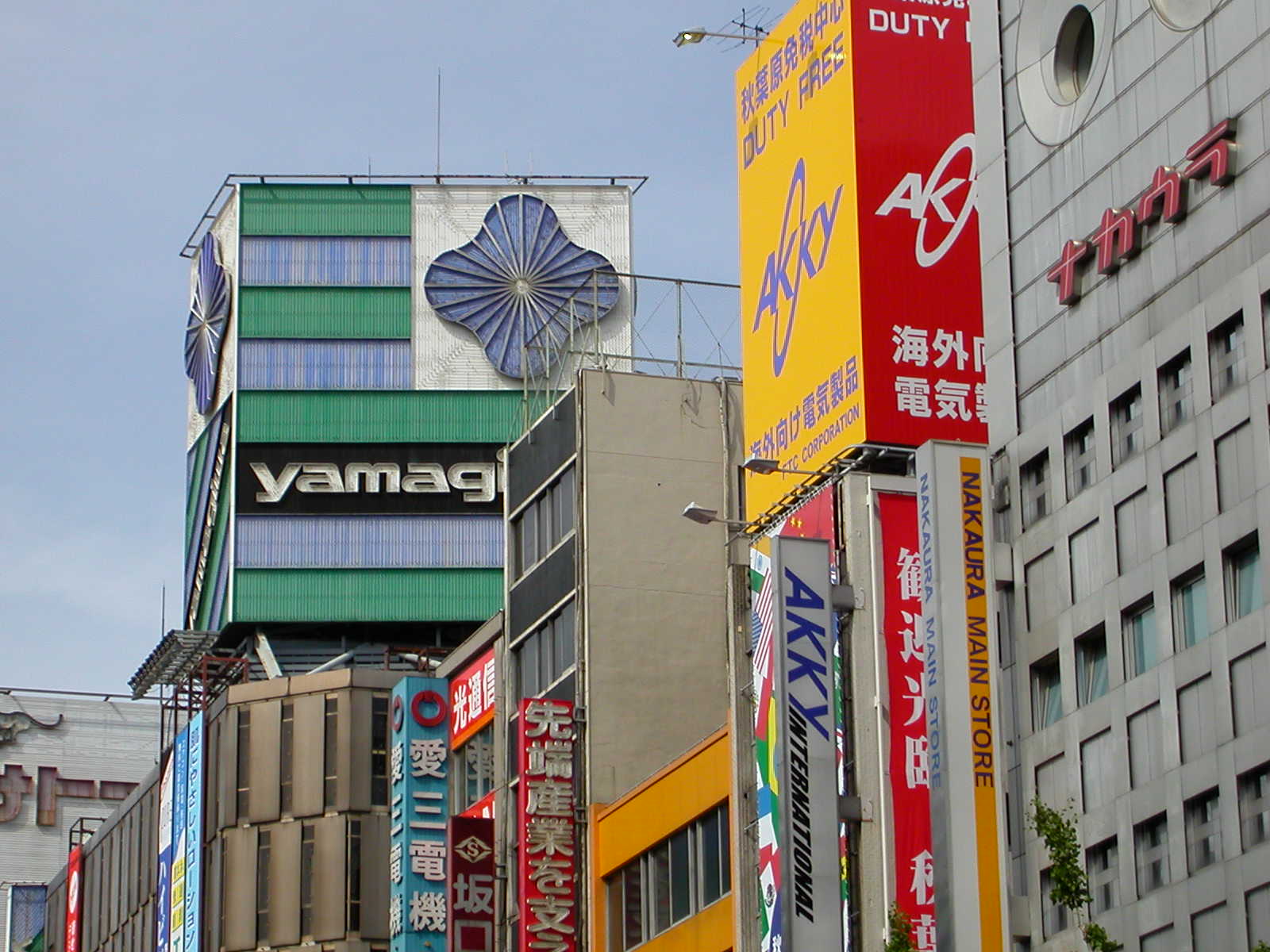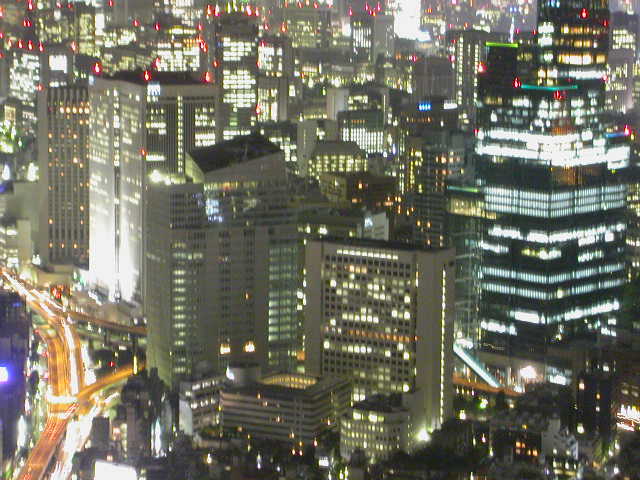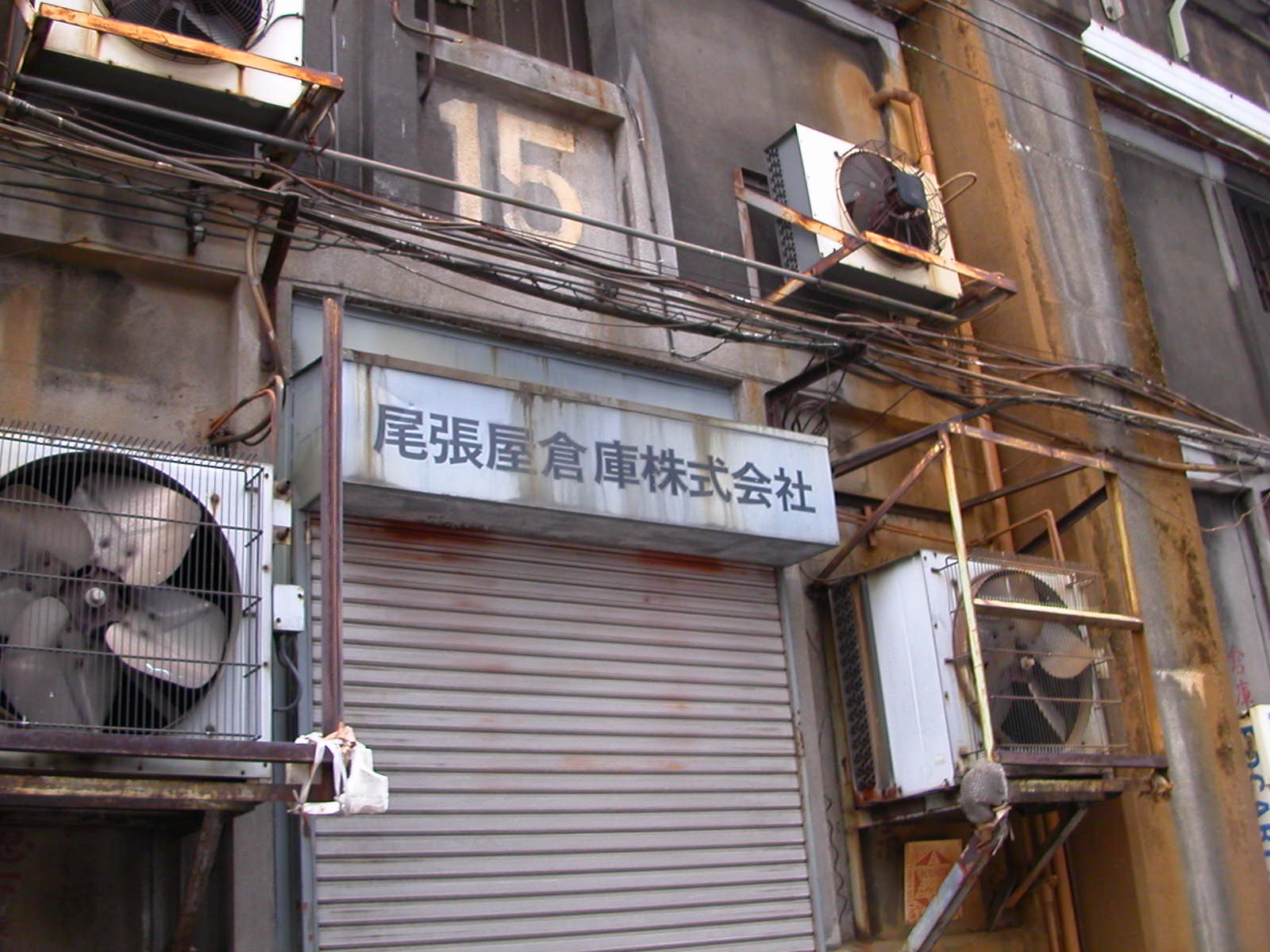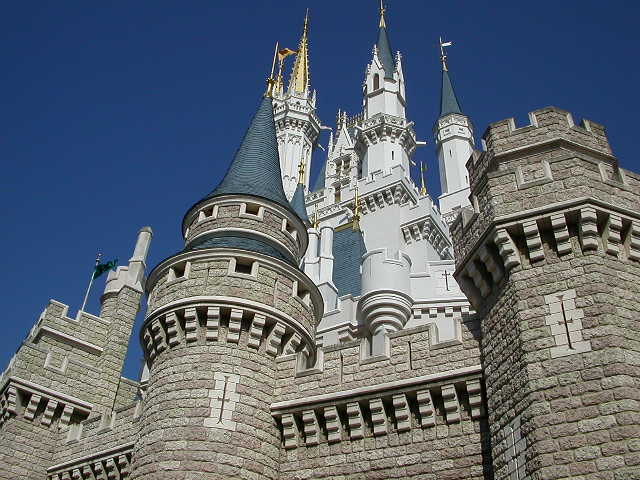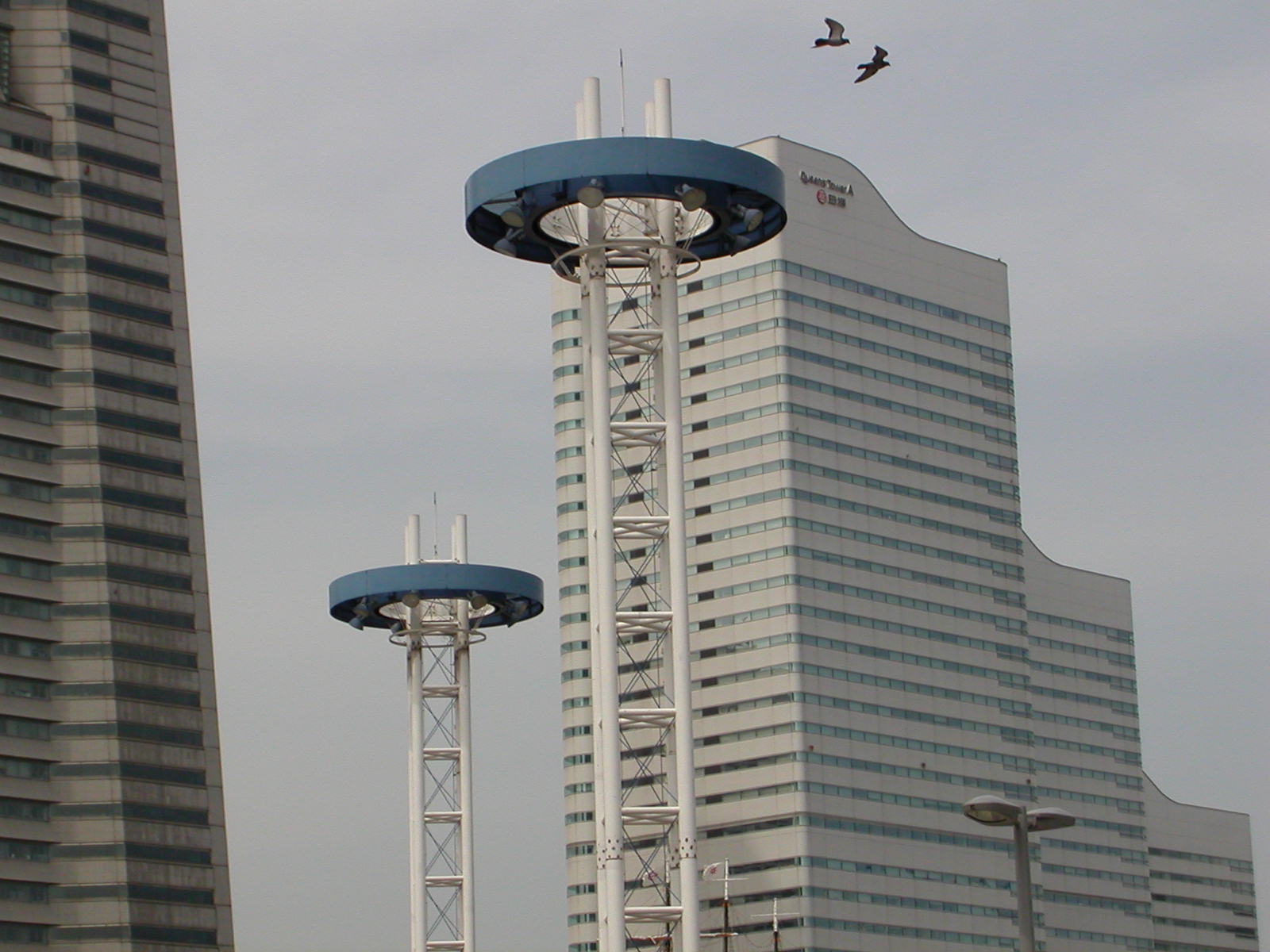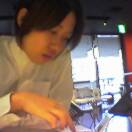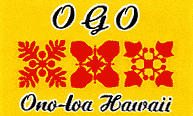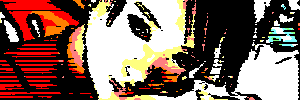That's right, I agree with Iwata -- Akihabara (aka Akiba) is a truly unique one-stop shopping area and audiophile dreamland. There are whole vast, high, heaving, towering department stores, devoted to nothing but sound. Iwata writes: "Of the many shops, pure audio dealerships have diminished to only a handful in the last decade. Akihabara's first golden age came in 1960s with the boom in home electronics appliances such as TV, washing machine and refrigerator. And in the '70s Japan's audio business saw the golden age and thousands of shops in Akihabara and other areas sold hi-fi components. Around 1990, the boom has gone with the burst "bubble economy," and the Akiba shops were filled with the new rising star -- personal computers. Since the late 1990s, another new spooky stuffs are gradually increasing in this area: the Manga shops that sell books and the animation-mania's shops selling plastic "figures" of the characters.
"Akihabara is rapidly changing with the "redevelopment" plans that are intended to vitalize the local economy. Therefore, the town will keep on changing for years, so take a careful look at the resources provided here and elsewhere if you are interested in getting there..."
Are you looking for war board games in Japan? According to BoardGameGeek.Com, Japan has the the second most prolific wargaming hobby(second to the US). You can find many of these in Akihabara at places such as Yellow Submarine, which maintains three outlets within walking distance of Akihabara Station. Many of these games are rarer than the proverbial hen's teeth outside of Japan. Some of the games you might expect to find in Akihabara include Minsk '41 (released in Japan in the 1980s and recently reprinted by Command Magazine Japan #57), Red Sun Black Cross (very rare alternate reality wargame where the Japanese are allied with the US against Germany), Pacific Fleet (said to be Second World War Pacific war game ever made), Seelow and Kustrin (designed by Masahiro Yamazaki), Stalingrad Pocket (another Yamazaki classic), Sengoku Daimyo... the list goes on, and on. Again, I have to repeat, Yellow Submarine is the place to go to start looking for war games such as these You can read all about Yellow Submarine lower in this article.
So, there you have it. I have to agree with Jacobs' opinion, negative though it may be -- quite a lot of floorspace in Akihabara is devoted to products of little interest to foreign shoppers, such as irons and vacuum cleaners and air-conditioners. Mind you the vacuum cleaners I saw this week at Yodabashi were pretty darn cool, and I still cherish the see-through plastic red techno iron I bought in Akihabara in 2002. But irons are irons and they will not excite the serious tech nut or visiting game fanatic. If you think that Akihbara is going to be some Oriental bazaar of retro computer parts and old handheld Donkey Kong games and so on, you might be disappointed. There is a market for retro gaming items in Japan -- they call them natsu-gei or "nostalgia games" -- but you will find Akihabara has its eyes to the future, not to the past. If you want validation of that, take a look at the cars driving down any Tokyo street. They are almost all impeccably new.
So here are those stores then:
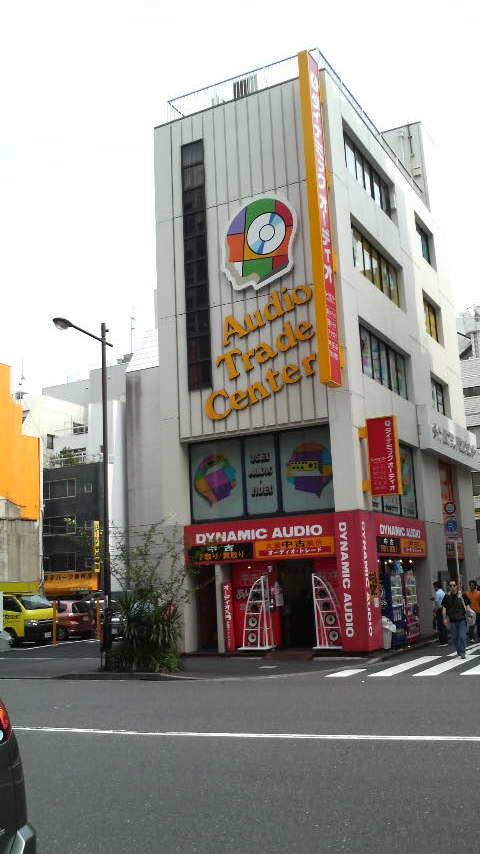
Audio Trade Center: 外神田1−15−4.
(1-15-4 Soto Kanda.)
Phone: 03/3255 1600.
All stores open from 10am to 8pm.
Operating 10 stores across Akihabara, including the Main Store, Number One branch and Ekimae branch for electronic equipment, the Pasokon branch for PCs and the Game One and Soft One to Three branches for CDs, DVDs, games and anime related goods.
To give you an example of what Ishimaru is like: I visited Ishimaru Soft 3, on Sotobori St (I think!) This seven-storey complex is devoted to one niche market only -- jazz and classical music. Well, I guess that is two niche markets, but you get my point. This is seven floors of jazz and classical music CDs, DVDs, and the sound systems to play them on. Jazz seems the wrong kind of background music for Akihabara somehow, but it seems to be a popular store. It is also very comfortable and there are plenty of semi theatre areas, with chairs and chilled music playing. If you need to chill out on a fierce Tokyo summer's day, head to one of the Ishimaru Soft buildings. Buy a can of ice tea from the vending machine, settle down and enjoy the Akihabara ambience...
Ishimaru Game One is a good place for the serious gamer on leave in Japan -- click here for more information about this place.
Dyna 5555 (A2; next to Ishimaru Denki Soft One) This shop epitomizes the new era in Akihabara; pure audio is no more omnipresent but concentrated to some select and mostly pricey premises. Anyhow, Dyna 5555 (called "four-five" according to the shop master) is a large-scale hi-fi dealer consisting of 7 floors that are completely dedicated to pure audio, from cheap accessories to super-expensive equipment. The shop's highlight is its 7th floor where super-expensive high-end audio equipment are on display, such as formidable Halcro dm58s, 47 Lab's Pitracer, two-inch diameter "snake" speaker cables connect the stuffs. The items on demo can be checked at the website http://www.dynamicaudio.co.jp/audio/5555/top.html by clicking "hearing lineup" (just ignore the lousy English - most people living in our islands don't speak, read and write foreign languages). Like Yamagiwa, the four-five showrooms suffer from too "dead" acoustics. Combined with the low ceiling, the place isn't good enough for serious audition. Nevertheless, it is utterly enjoyable just watching the classy stuff and the guys in audition.
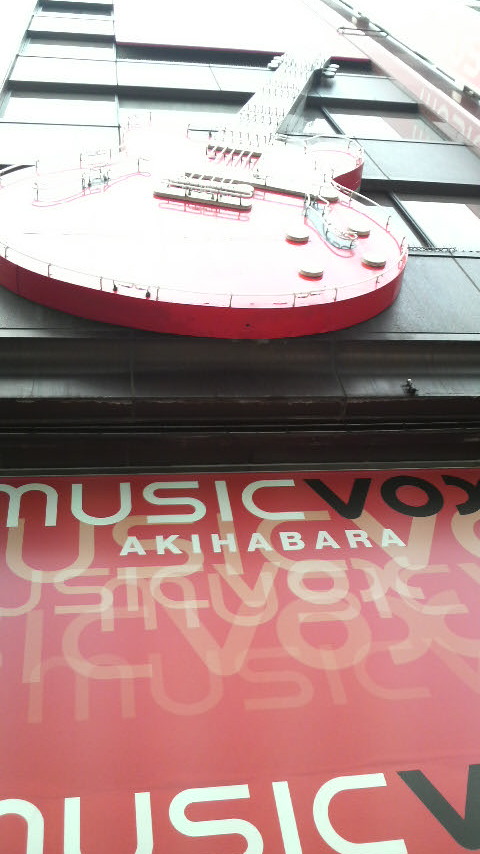
Laox Music Vox Akihabara: .
Phone: 03/3258 4141. Web: http://www.laox.co.jp/english/laox_store/music_vox.html.
A tall thin department store with the distinctive red electric guitar hanging over the facade, this is one of the first Akihabara stores that I visited after moving to Japan in 2000. I was amazed then, as I am amazed now, by the vast array of musical goods inside. There is one floor of the building (the 6th floor) reserved for electronic pianos and wind instruments. Plenty of guitars on the first two floors, priced from 30,000 yen to 1,000,000 yen (that's 10 000 dollars in American!) The 3rd floor has books and bass, the 4th floor sound equiptment, while DJ's should make a beeline to the 5th. All in all this is seriously ample floorspace packed with amps, speakers, series upon series of synthes, microphones, hedonistic headphones, electric and acoustic instruments, amplifiers and effecters and so on, and on. The building is also home to regular DJ demonstrations and performances, which might help add a bit of spice to a region of Tokyo conspicuously lacking in decent electronic music clublife. There are studios on the top floor.
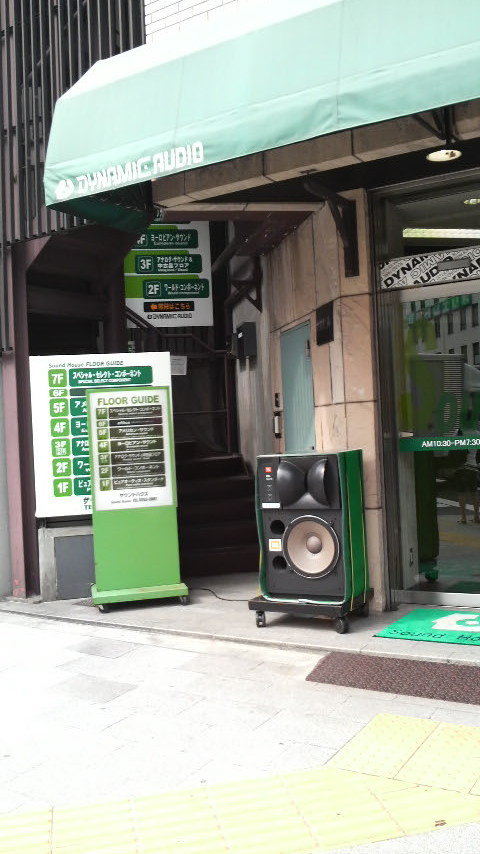
Sound House: Next to Denki Gai exit of Akihabara Station.
A 7 floor big green building in the back (musical) end of Akihabara.Phone 3253 2001. Has floors with names like Pure Audio Standard, Analog Sound/Used and American Sound. There is also a whole 'nother floor, dedicated to the European Sound.
In his Akihabara tour guide, Harmful says:
"Akihabara -- call it Akiba for short -- is on the JR Yamanote line. Go out the "Akihabara Electric Town" (Denki Gai)exit, and then GO LEFT once the machine eats your ticket. once you get to the door, turn RIGHT. you are now, hopefully, standing outside and shaking your head in bewilderment at the 1,000,000 billboards that plaster every square inch. quick, look at your ass! It has an ad on it now, doesn't it? how do they DO that??? anyway, if you look to your right, you will see a huge yellow neon sign on the opposite side of the street. the sign is saying: ラジオ会館 (radio hall)
(pronounced Rah-jee-oh kai-kann.)
This is like THE toy store. go up the escalator.
2F: Star Wars / Western toys and figures, as well as a hundred models of construction equipment, cranes, etc.
3F: Porn and Manga.
4F: just an INSANE amount of tiny stores selling TINY toys.
5F: merely a "regular" computer store.
6F: THE PAYOFF. VOLKS doll store. is just this huge place full of doll parts, doll clothes, doll eyes, and of course lots of maniacs. again, one of those places which you might not want to buy anything but it is good like a museum!"
Sega
There are a few Sega outlets in Akihabara, and they are all must-sees for all those Sega fanatics out there:
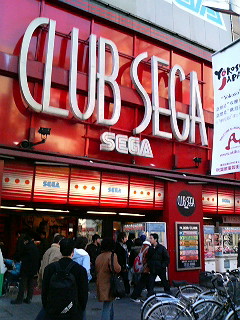 Club Sega: .
Club Sega: .
Remember the local video arcade you used to hang out when you were in your teens, playing Pacman and Galatica (if you old enough)... take that nostalgic old small town arcade and multiply it by a factor of a thousand, and you would have an approximation of the Club Sega Arcade in Akihabara. As I stated before, this is five floors of nothing else but games. It is worth repeating that, for the third time. This is five floors of games. A serious gamer could easily spend a life in here. Just duck out every mealtime to one of the nearby Maid Cafes, to stock up on warm human company...
One visitor to Club Sega said: "Yes,I loved the place... The first floors are for "UFO" machines where you "can get" some Evangelion, Capcom and Sega figures (and more stuff too, after popping hundred yen coins into the coin slot). Five floors of arcade games... and not just Sega. And this is not the only one (Sega building) I saw."
"One floor was full of Street Fighter Hyper Fighting (the new mix between all versions, available for Japanese PS2) machines, all networked and in a tournament." Click the nearest link above to see photos of Club Sega in action.
There is another Sega institution across the road, up closer to the station -- and it too is packed with games and gamers.
Sofmap Sofmap operates as many as 16 shops in the Akihabara area including multiple branches, which specialize in used computers. The stores are numbered from 1 to 14 plus the main store and the Kakuta branch. A duty free floor can be found in store number one. Open daily 11:00 to 20:00.
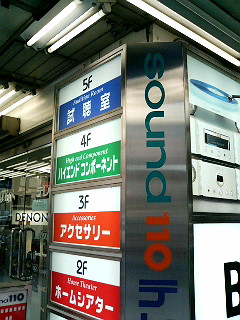 Sound 110: 外神田1−3−11.
Sound 110: 外神田1−3−11.
(1-3-11 Soto Kanda.)
Phone: 03/3251 5535. Map: http://www.akiba.or.jp/map/03402.html.
As I have already stated, the main music center of Tokyo (that is the musical instruments area) is at Ochanomizu (ノ水). It is interesting that this store -- Sound 110 -- lies on the way from Akihabara to Ochanomizu. If you were a crow and you started flying from Akihabara to Ochanomizu, about one-fifth or one-sixth of the way to Ochanomizu you would come across Sound 110. Interestingly, it is bundled next to a bunch of other music shops. It is almost as if there is a musical corridor stretching all the way from Akihabara to Ochanomizu. When you start out at Akihabara it is all 100 per cent electronic music, reflecting the nature of the Electronic Town -- every music store is packed with synthes, electric pianos, headphones and DJ gear. At the Ochanomizu end of the corridor, things are pretty much 100 per cent acoustic -- violins and acoustic guitars by the bucketload. Sound 101, being in the Akihabara rather than Ochanomizu sphere of influence, is basically electronic.
Five floors of fun here -- speakers, amps, audio junk, DVD & HDD プレーヤー (players). And the store motto is: "音のことなら1から10までという意味の店名、それがsound 110です。"
Contact the author Rob Sullivan at coderot@gmail.com. Anticopyright May 2010/July 2004.
![]()
|
||||||

